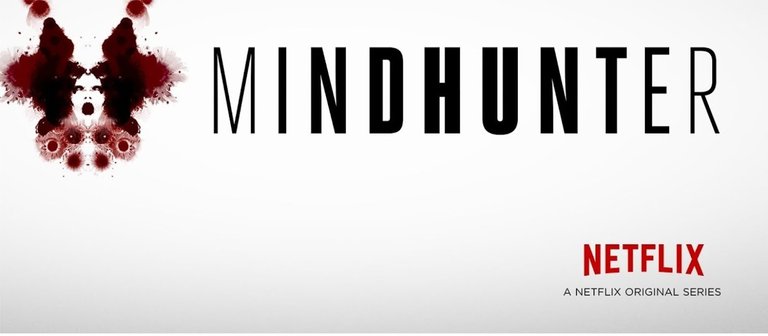
Those who love the intricate, fascinating and controversial world of serial killers may have somehow ended up reading John Douglas' multi-award winning best-seller; Mind Hunter: Inside FBI's Elite Serial Crime Unit, co-written with Mark Olshaker, which describes the secrets of the FBI's now famous Behavioural Science Unit in Quantico, Virginia, United States of America. The same fraction of the American bureau of investigations, which in the 1970s began to shape a series of investigators and criminal profilers who have left their mark and left a school around the world. Among them are, as a founding member, the aforementioned John Douglas, Robert Ressler, Roy Hazelwood, among many others who gave shape to perhaps the best known of the existing units within the US Federal Bureau of Investigation.
Behavioural science or behavioural science? This rhetorical question is asked by the author in one of the chapters of the book that gives meaning and inspiration to the series produced by Netflix and directed by David Fincher, and it is not just any question. Because of this way of rethinking existing paradigms, the now renowned researchers, shaped the objectives of the unit: to explain the why of the horrible crimes committed by people who simply had no dealings with their victims and did not know them. Or in other words, crimes committed by strangers. And this is extremely key.
In the 1970s, the way the FBI classified murders was quite rudimentary: murder by acquaintance, suicide, murder of passion, and murder by strangers. There were other sub-categories, but in essence, these were the three sub-categories in order to give the forensic experts a search horizon and to close cases if they were able to reach closure. Many of these reprehensible acts were committed by people who simply had no relationship with the victims. Moreover, in terms of violence, they appeared to be far more aggressive, ruthless and cruel than those who did know their victims. But we will skip this section and develop it a little later.
Quienes aman el mundo intrincado, fascinante y polémico de los asesinos seriales, quizá de algún modo han terminando leyendo el multi premiado best-seller de John Douglas; Mind Hunter: Inside FBI's Elite Serial Crime Unit, co escrito con Mark Olshaker, donde se describen los secretos de la ya famosísima unidad de Ciencias de la Conducta del FBI en Quantico, Virginia, Estados Unidos de América. Misma fracción del buró de investigaciones estadounidense, que en los años 70' empezó a dar forma a una serie de investigadores y perfiladores criminalísticos que han dejado huella y escuela alrededor del mundo entero. Entre ellos están, como miembro fundador el ya mencionado John Douglas, Robert Ressler, Roy Hazelwood, entre muchísimos otros que dieron forma a la quizá más conocida de las unidades existentes dentro del Buró de Investigaciones Federales del Estado norteamericano.
¿Ciencias del comportamiento o ciencias de la conducta? Esta pregunta retórica se la hace el autor dentro de uno de los capítulos del libro que da sentido e inspiración a la serie producida por Netflix y dirigida por David Fincher, y no es cualquier pregunta. Debido a este modo de replantearse los paradigmas existentes, los ya renombrados investigadores, dieron forma a los objetivos de la unidad: explicar el por qué de los horribles crímenes cometidos por personas que sencillamente no tenían trato alguno con su víctimas y no les conocían. O dicho de otro modo, crímenes cometidos por extraños. Y es que, esto es sumamente clave.
En la década de los 70', el modo en el que el FBi clasificaba a los asesinatos era bastante rudimentario: asesinatos cometidos por conocidos, suicidio, asesinato pasionales, y asesinatos cometidos por extraños. Habían otras sub categorías, pero en esencia, éstas era las tres subcategorías para poder dar un horizonte de búsquedas a los peritos criminalísticos y cerrar casos en caso de que éstos pudieron llegar a un cierre. Gran parte de estos actos repudiables, era cometido por personas que sencillamente no guardaban ningún tipo de relación con las víctimas. Y que además, en grado de violencia, parecían ser bastante más agresivos, despiadados y crueles que aquellos que sí conocían a sus víctimas. Pero este apartado, nos lo ahorraremos y lo desarrollaremos un poco más adelante.
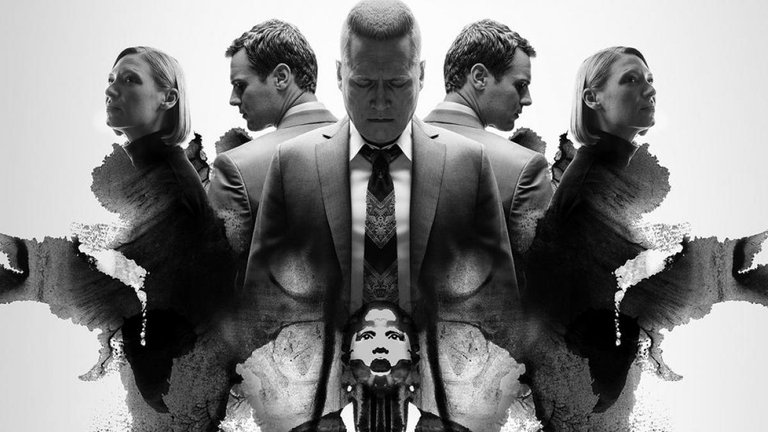
Now, does Netflix and a best-seller work well together? Well, it certainly does. What's more, it's quite a winning formula, due to the multiple successes that cinema in one way or another has brought to the big or small screen, through mega-productions. And furthermore, the choice of casting, the creative team within the original and adapted scripts, art direction and general direction, have no qualms whatsoever. And obviously, I am referring to someone I admire and who has always demonstrated his marvellous handling of the psychological thriller; "the one and only": Mr. David Fincher. A genius behind spectacular productions such as "Seven", "Gone Girl" and "The Fighting Club", nothing more and nothing less, an all-rounder to handle an unparalleled (literary) work that Netflix has produced and developed in an incredible way. To the point that the viewer himself does not feel that he is not in a series, but in a film proper.
This effect, that of being in a film, is due to the marvellous work carried out in the photographic direction of Mindhunter by Erik Messerschmidt, who undoubtedly impregnates the atmosphere with the colours of the 70's but without forgetting the psychological approach of the series itself. With dark, sometimes grey tones and subdued colours that contrast with the many outdoor scenes filled with the warmth of the sun, or the sparkle of a snowy morning. Depending on the chapter, the city and the mood of the chapter we are talking about. Another subtle but fascinating feature produced by Netflix is the incredible exteriors in almost every episode. They cover the whole of the United States. From San Francisco, with the famous Ed Kemper in the Vacaville prison to Jacksonville in the other east end of the country of the stars and stripes, in Florida.
David Fincher in Mindhunter has really done his best to bring the original personalities described in the book by the illustrious John Douglas down to the last millimetre. And, as in any adaptation, the characters do not have the original names, but have been given different ones. The same goes for the introduction of female power, which in the original work is not as marked and transcendental as it is in Mindhunter: the series. But as is customary in my reviews, spoilers are not part of the analysis. The reason? Very simple, the idea is to promulgate genuine interest and in an elegant way, to do justice to the magnificent series that are produced by the big streaming companies, as we all know. Because that's another myth, they do produce good material. It's not all consumption for leisure without cinematic depth or substance within the scripts.
Ahora bien, ¿Netflix y un best-seller? ¿Se da bien esa combinación? Pues, lo cierto es que sí. Es más, es una fórmula bastante ganadora, debido a los múltiples éxitos que el cine de una u otra forma ha traído a la pantalla grande o chica, a través de mega producciones. Y además, la elección del casting, del equipo creativo dentro de los guiones originales y adaptados, dirección artística y dirección general, no guardan ningún tipo de reparos. Y obviamente, me estoy refiriendo a alguien a quien admiro y que ha demostrado desde siempre su manejo maravillo dentro de thriller psicológico; "the one and only": Mr. David Fincher. Un genio detrás de producciones espectaculares como "Seven", "Gone Girl" y "The fighting club", nada más y nada menos, un todoterreno para manejar una obra (literario) inigualable y que Netflix, ha producido y desarrollado de un modo increíble. Al punto, que el propio espectador no siente que está dentro de una serie, sino en una película propiamente dicha.
Este efecto, el de estar presenciando una película es debido al maravilloso trabajo llevado a cabo en la dirección fotográfica de Mindhunter por Erik Messerschmidt, que sin duda alguna impregna el ambiente con los colores propios de la década de los 70's pero sin olvidar el enfoque psicológico de la misma serie. Con tonalidades oscuras, a veces, grises y colores tenues que hacen contraste con el montón de escenas en exteriores llenas de la calidez que brinda el sol, o lo reluciente de una mañana nevada. Dependiendo del capítulo, la ciudad y el mood del capítulo del que hablemos. Es que, otra sútil pero fascinante característica producida por Netflix son los increíbles exteriores que hay en casi todos los episodios. Abarcan la totalidad de los Estados Unidos. Desde San Francisco, con el famoso Ed Kemper en la cárcel de Vacaville hasta Jacksonville en el otro extremo este del país de las barras y las estrellas, en Florida.
David Fincher en Mindhunter realmente ha hecho su mejor esfuerzo para traer las personalidades originales, descritas en el libro del ilustre John Douglas al milímetro. Y es que, como en toda adaptación, los personajes no cuentan con los nombres originales sino que se han decantado por otros. Al igual, que la introducción del poder femenino, que en la obra original no es tan marcada y trascendental, como sí lo es en Mindhunter: la serie. Pero como ya es acostumbrado en mis reviews, el spoiler no forma parte de los análisis ¿La razón? Muy simple, la idea es promulgar el interés genuino y de una forma elegante, hacer justicia a las magníficas series que se producen desde las grandes compañías de streaming, como bien todos sabemos. Porque ése es otro mito, sí que producen buen material. No todo es consumo para ocio sin profundidad cinematográfica o sustancia dentro de los guiones.
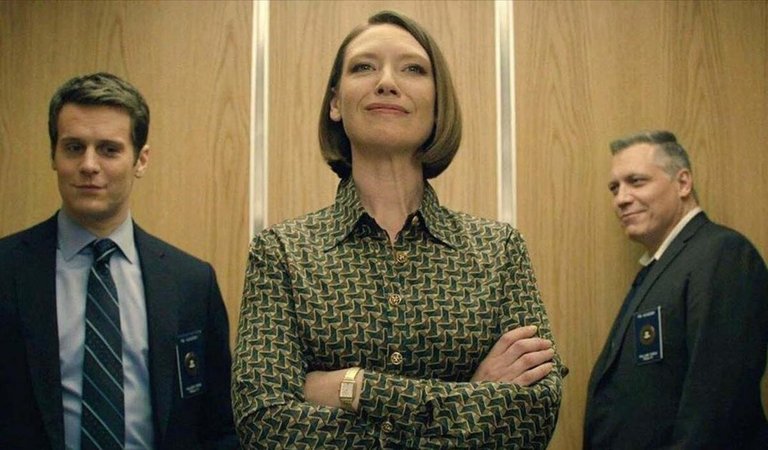
On the other hand, the villains. Those who have followed David Fincher's career in any way will be able to affirm (with me) that if there's one thing this incredible director does well, it's give prominence to the source of evil; or put another way: the villains carry weight within his directions. And obviously, with material so rich in people who know what evil is, it could be no exception. Charles Manson, Ed Kemper, Wayne Williams, the BTK killer, Charles "Tex" Watson, Richard Speck, Elmer Wayne Henley Jr, among many, many more, are just some of the notorious killers that Fincher, along with his team of writers and developers, bring to life in the series.
Let's remember that Mindhunter is based on the conformation of the "Behavioral Science Unit" or the "Behavioral Science Unit" of the FBI to solve the crimes committed by "strangers" that it had previously reflected. But also to classify them, to know their motivations, psyche, original evil, traumas and characteristics. With the aim of creating a Manual, which in fact does exist and is a milestone of the Bureau in criminal matters, recognised worldwide. The name, for you to read and see the final work framed in Mindhunter, is: "Crime Classification Manual. A standard system for investigating and classifying violent crime". Which, as if that weren't enough, within the same plot arc of the series, has an outstanding importance that is impossible to ignore, among many other things; in case it has caught your interest, I can only tell you, what are you waiting for? You should go and watch both seasons and then come back here to comment on your experiences.
Por otro lado, los villanos. Quienes han seguido de alguna forma la carrera de David Fincher, podrán afirmar (conmigo) que si algo hace bien este increíble directo es brindar protagonismo al origen de la maldad; o dicho de otro modo: los villanos tienen peso dentro de sus direcciones. Y evidentemente, con un material tan rico en personas que saben lo que es la maldad, pues no podría ser la excepción. Charles Manson, Ed Kemper, Wayne Williams, el asesino BTK, Charles "Tex" Watson, Richard Speck, Elmer Wayne Henley Jr, entre muchísimos más, son tan solo algunos de los tristementes célebres asesinos que Fincher, junto a su grupo de escritores y desarrolladores dan vida dentro de la serie.
Recordemos que Mindhunter es basada en la conformación del "Behavioral Science Unit" o la "Unidad de Ciencias de la Conducta" del FBI para resolver los crímenes cometidos por "extraño" que antes había reflejado. Pero también para clasificarlos, conocer sus motivaciones, psique, original del mal, traumas y características. Con el objetivo de formar un Manual, mismo que de hecho, sí existe y es un hito del Buró en materia criminal, reconocido mundialmente. El nombre, para que lo lean y vean el trabajo final enmarcado en Mindhunter, es: "Crime Classification Manual. A standard system for investigating and classifying violent crime". Que, por si fuera poco, dentro del mismo arco argumentativo de la serie, tiene una importancia destacada imposible de obviar, entre otras muchas cosas; que en caso de que haya cobrado tu interés, pues solo puedo decirte ¿qué estás esperando? Deberías ir ya y ver sus dos temporadas y después volver acá a comentar tu experiencia.
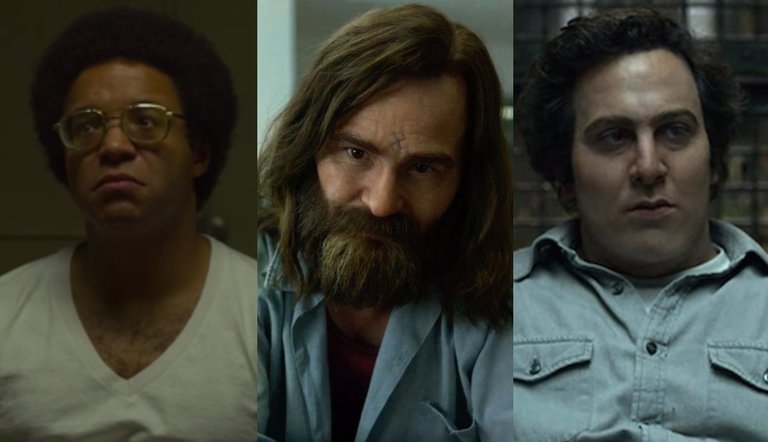
The bad thing? Well, nothing is perfect, even by David Fincher's standards... Personally, I find it a bad thing that Netflix has put it in limbo. It's not officially suspended, but it's not cancelled either. Which for me, as a fan of the series and thrillers, makes me very anxious. While it is true that the statements made by the director himself, saying something like that he will resume the project in the future and will give an end to the series, the truth is that it is undeniable the somewhat bitter taste that leaves you that something so well done, catching and with so much care, has only two seasons and that also leaves you so trapped to only remain in "we'll see ...". And well, for now, we have to wait (for the best, obviously) and enjoy the good things of our times. Good cinema, the convenience of streaming as a platform and praising, when it is necessary to do so, truly outstanding productions.
¿Lo malo? Pues nada es perfecto, incluso para los estándares de David Fincher... Personalmente, hallo como algo malo que Netflix la haya puesto en un limbo. Y es que no está suspendida oficialmente, pero tampoco cancelada. Lo que para mí, como fan de la serie y de los thrillers me genera muchísima ansiedad. SI bien es cierto, que está las declaraciones hechas por el mismísimo directos, diciendo algo así como que retomará en el futuro el proyecto y le dará un final a la serie, lo cierto es que es innegable el sabor un tanto amargo que te deja que algo tan bien logrado, atrapante y con tanto esmero, cuente con únicamente dos temporadas y que además, te deje tan atrapado para solo quedar en "veremos..." Y bueno, por ahora, toca esperar (lo mejor, obviamente) y disfrutar de lo bueno de nuestros tiempos. El buen cine, la comodidad del stream como plataforma y alabar, cuando haya que hacerlo, las producciones realmente fuera de serie.
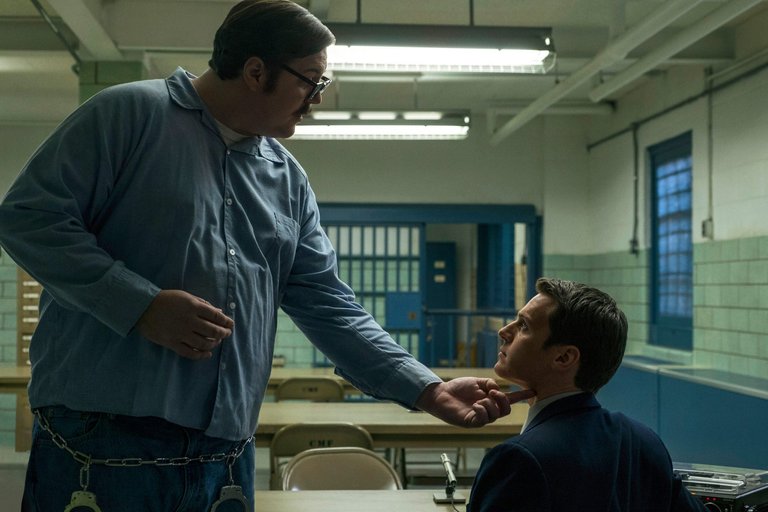
Siempre me han recomendado esta serie, pero la verdad que ni el primer capítulo he visto, aunque ya me animaré más con tus post.
!discovery 25
This post was shared and voted inside the discord by the curators team of discovery-it
Join our community! hive-193212
Discovery-it is also a Witness, vote for us here
Delegate to us for passive income. Check our 80% fee-back Program
Excelente Recomendación! una interesante mirada a como fueren los inicios de la psicología forense y el nacimiento del concepto de asesinó serial... una verdadera joya narrada de manera lenta y bien construida, tristemente no cuenta con mas temporadas, el deterioro de los personajes mientras mas entienden a los asesinos que persiguen es muy interesante.
Congratulations @freakshow90! You have completed the following achievement on the Hive blockchain and have been rewarded with new badge(s):
Your next target is to reach 2000 upvotes.
You can view your badges on your board and compare yourself to others in the Ranking
If you no longer want to receive notifications, reply to this comment with the word
STOPCheck out the last post from @hivebuzz:
Support the HiveBuzz project. Vote for our proposal!
Bueno, lo interesante de Mindhunter es que está basada en el libro del mismo nombre, escrito por un genio como John Douglas. Netflix, al igual que Fincher, se inspiraron en ese best-seller para dar rienda suelta a la serie. Y sí, que esté en un limbo es lo que a mí modo de ver siempre te da esperanza que la continúen, porque francamente es impecable. Tiene un tratamiento cinematográfico increíble y sobre todo, el reparto extremadamente cuidadoso con los detalles para los personajes. Sencillamente, amo esta obra y me siento re orgulloso que a ustedes les haya gustado el review. Saludos a todos y mil gracias.